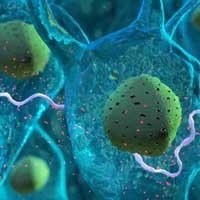Depression and Anxiety Linked to Lyme Disease

In a recent Ted Talk, Professor Turhan Canli from Stony Brook University in New York asked, “Could depression actually be a form of infectious disease?” We say yes! While practicing medicine for 15 years and after treating thousands of patients who had chronic Lyme disease symptoms, our physicians found that many of our patients with depression and anxiety really had infections causing the problem. Eliminating the Lyme disease infection was what really helped these patients. This is because the brain chemistry, neurotransmitters, infections and neurotoxins are all connected. Patients that suffer from chronic infections always have chronic inflammation and in a large number of patients – it is the cause of depression, anxiety and mood alterations. This is not some new idea. According to Medicine.net, “Researchers have also found that anxiety and depression occur with an increased rate in people with Lyme disease.” Going further, what if depression were a result of infection? That is the thesis that Professor Canli proposes in his Ted Talk and we have clinically seen that this matches with many of our patients.
Could depression actually be a form of infectious disease? – Turhan Canli
Chronic Lyme disease and its co-infections can cause depression. If we look at the cousin of Lyme disease, Syphilis, and its studies related to mental health issues, we see depression, anxiety disorders and much more. But a disturbing trend that we have seen in our society is patients with depression and anxiety perpetually using antipsychotic drugs, like the book “Prozac Nation” mentions. It's a multi-billion dollar industry that never treats the cause but numbs you and “manages your pain for life.” We believe that many of these people in fact have infections (such as Lyme disease) that are causing their depression. Patients with Chronic Lyme disease and other infections have inflammation that changes brain chemistry and leads to depression.
Turhan Canli postulates that, “Perhaps major depression is not primarily an emotional disorder.” Something from the Ted Talk that really resonated with our medical clinic was when Professor Canli mentioned that, “Major depression is associated with in balances in neurotransmitters.” Well that is exactly what happens with some cases of Lyme disease. Neurotransmitters can become blocked or disrupted when the Lyme disease infection passes through the blood brain barrier. A good example of this is Yolanda Foster, the reality star who was recently in the news because she suffers from Neuroborreliosis, a medical condition where Lyme disease affects brain function. It is not a stretch then, to see how Neuroborreliosis could lead to depression.
The Ted Talk brings up some other good points about what we know about depression and the brain. According to Turhan Canli, “For the past 60 years, depression has been associated with the brain. We do not understand the underlying methods that are causing depression. Many times, a doctor gives you prescription, and if it works, good. If it doesn't work, however, doctors up the dose or switch medications. That is the approach after 60 years of research.” Perhaps we need something more? We have found, and Turhan Canli also says that, “it turns out depression is associated with biomarkers of inflammation – a signal of illness.” Therefore, inflammation may cause or contribute to depression. Another aspect that our clinic and Professor Canli have both concluded is that the cause of inflammation is many times an immune response to infection that can come from bacteria, parasites, mold, mycotoxins or viruses. Lyme disease many times comes along with many other co-infections, not just bacterial. The background behind the entire Ted Talk is that the genes of depression could be attributed to the genome of micro-organisms, and in our case and argument, Lyme disease. Everything that Professor Canli is talking about, we have found in our medical clinic.
Lyme disease many times comes along with many other co-infections, not just bacterial.
Many patients suffering from depression and anxiety could very well have various infections or a chronic form of Lyme disease. Because of the poor testing for the disease, the likelihood rises even more. Also, occurrences of Lyme disease have risen and they are not only on the East Coast; cases of Lyme disease have cropped up all over the country. The mission of our medical group is to help patients with the highest form of personalized diagnosis and treatment. We do this with a comprehensive and total approach dedicated to eliminating the infections first and foremost, but also eliminating co-infections, biofilm communities, heavy metal toxicity, chemical toxins; and we accomplish all of this through state of the art testing and the incorporation of the best technology and specialized unique treatments from all over the world. We then rebalance brain chemistry (affected by Lyme disease) by providing the essential building blocks that the brain needs to be healthy. In the words of Professor Canli, “Let's not settle for symptom reduction but look for a genuine cure.” That is our aim, to help patients resolve these matters by addressing real causes and not merely symptoms. If you or a loved one has questions about depression, anxiety, inflammation and/or Chronic Lyme disease, contact us.























